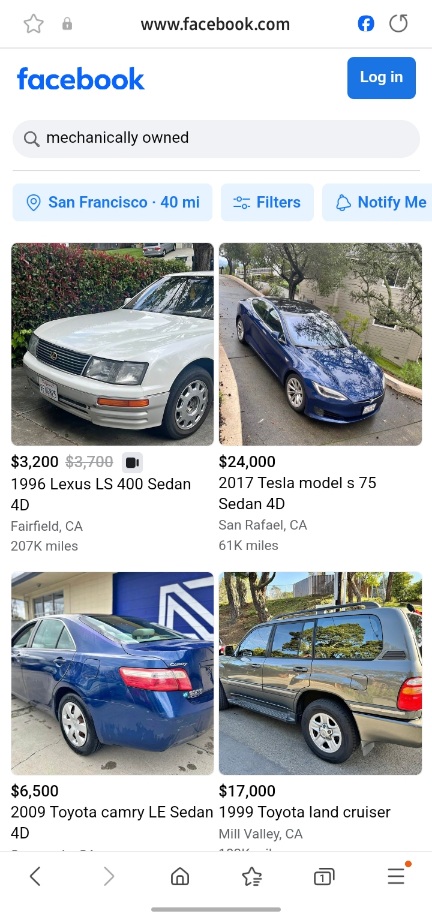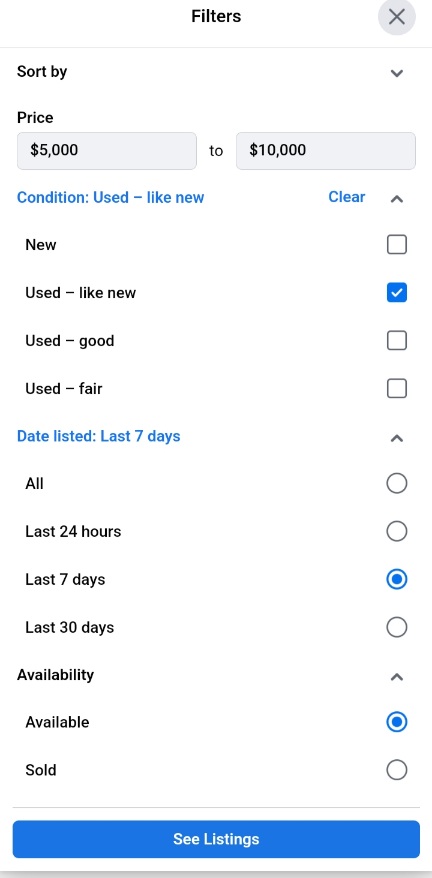Facebook Marketplace is a total treasure trove for finding used cars; sometimes you can snag amazing deals and find stuff right near you. But let’s be real; it can also be a bit of a minefield. This guide is all about helping you find a car that actually runs well, get it for a fair price, and avoid those sketchy sellers out to get you.
If Facebook Marketplace is totally new to you, maybe check out my general guide first. That way, you’ll get the hang of how it works before diving into the whole car-buying thing.
Contents
Why Use Facebook Marketplace for Cars?
Here are some of the advantages of turning to Facebook Marketplace to find your next ride:
- Wide Selection: A vast array of vehicles are offered on Facebook Marketplace, giving you a better chance of finding the specific make and model you want.
- Potential Bargains: Since you’re often buying from a private seller, you can frequently find lower prices than dealerships.
- Local Convenience: You can find cars listed right in your area, making test drives and pickups easy.
The Risks of Buying Facebook Marketplace Cars
Before you jump on the first deal you see, consider these potential pitfalls:
- Scams: Fake listings designed to trick you out of money are, unfortunately, common on Facebook Marketplace.
- Hidden Damage: Sellers might not always be upfront about a car’s history or mechanical problems.
- No Warranties: Unlike dealerships, private sellers on Facebook Marketplace typically don’t offer any warranties on their vehicles.
How to Find Trustworthy Listings on the Facebook Marketplace
Here’s how to weed out the bad and focus on legitimate car listings:
- Search Smart: Start with a broad search, then use filters to narrow things down by location, price range, make, model, year, mileage, and transmission type.
- Consider searching by keywords like “mechanically owned” or “one-owner” to potentially surface more reliable cars.
- Examine Listings Carefully: Lots of high-quality pictures from various angles are a good sign.
- Check the seller’s profile. How long have they been on Facebook? Do they have any positive reviews?
- Be wary of listings with very short descriptions, misspellings, or prices that seem too good to be true.
- Direct Message the Seller: This is the best way to begin a conversation and ask initial questions about the car.
Questions to Ask the Seller
Don’t be afraid to ask a lot of questions! Here are some crucial ones:
- Why are you selling the car?
- Can you provide a detailed maintenance history?
- Has the car been in any accidents?
- Are there any known mechanical issues?
- Is the title clean and in your name?
- Would you be willing to have a pre-purchase inspection done?
Inspecting the Car in Person
Prior to purchasing any secondhand automobile, a comprehensive inspection is necessary. If the vendor is amenable, proceed with these actions:
- Choose a Safe Location: Meet during the day in a well-lit, public place.
- Bring a Friend: It’s always a good idea to have someone else with you.
- Do a Visual Inspection: Check for:
- Body damage, rust, and mismatched paint
- Worn tires, leaking fluids, or misaligned panels.
- Signs of wear inside, like rips in upholstery or broken features.
- Take a Test Drive: Pay attention to:
- How the car handles, accelerates, and brakes.
- Any odd noises or smells.
Always Get a Pre-Purchase Inspection
Even if the car seems fine, paying for a pre-purchase inspection from a trusted mechanic is essential. This will help identify any hidden issues that you could easily miss.
Negotiating the Price
- Do Your Research: Check sites like Kelley Blue Book or Edmunds to know the car’s fair market value. Be sure to factor in the car’s age, mileage, condition, and any optional features.
- Be Prepared to Walk Away: If the seller isn’t willing to negotiate or the car has issues, don’t feel pressured to buy. There are plenty of other cars out there, and patience will help you land a better deal.
- Have a Price in Mind: Know your maximum budget beforehand. Start with a slightly lower offer than your maximum to give yourself room to negotiate.
- Don’t Focus Solely on the Monthly Payment: Negotiate the total price of the car first. Sellers can manipulate monthly payments by changing the loan terms, obscuring the total cost.
- Use Your Findings: If your research or pre-purchase inspection uncovered issues, use them as leverage to justify a lower offer.
Example:
“According to my research, comparable vehicles in this condition are selling for about $8,000. I would feel comfortable beginning at $7,500 given the miles and the worn tires.”
Additional Tips:
- Be respectful but firm in your negotiation.
- Don’t be afraid to make a counteroffer if the seller’s first counter is too high.
- Consider offering cash, some sellers might like the idea of a direct cash offer.
How to Avoid Facebook Marketplace Car Scams
Sadly, there is a genuine risk from fraudsters on Facebook Marketplace. To protect your finances, be aware of these warning signs:
- Unusually Low Price: If a price seems impossibly low for the car, it’s probably a scam.
- Requests for Payment Upfront: Never pay for a car sight unseen, and avoid using untraceable payment methods like wire transfers, prepaid debit cards, or gift cards.
- Pressure to Buy Quickly: Scammers try to create a sense of urgency to prevent you from thinking clearly.
- Communication Outside of Facebook: If the seller wants to move the conversation off Facebook, be cautious. They might be trying to avoid getting their account flagged for suspicious activity.
Case Study: A Wary Story
Sarah believed she had discovered a fantastic offer on Facebook Marketplace for a Honda Civic. The photos were well-exposed, and the pricing was reasonable. The seller said the car was in perfect condition and urged Sarah to pay a deposit quickly to secure it. Excited, Sarah sent the money via a wire transfer. She never heard from the seller again, and she lost her deposit.
Completing the Purchase
Following your inspection, if you’ve discovered a car you like and are prepared to purchase it, follow these steps:
- Agree on a Price: Negotiate a final price with the seller and get it in writing.
- Create a Bill of Sale: This should include the agreed-upon price, date of sale, VIN, both your names and addresses, and a statement that the car is sold “as is.”
- Handle the Title Transfer: The process varies by state, so check your local DMV website for requirements.
- Payment: If you’re not paying in cash, use secure methods like an escrow service or a cashier’s check from your bank.
Additional Tips for Buying Facebook Marketplace Cars
- Trust Your Gut: If something feels off about a deal or a seller, walk away. It’s better to be safe than sorry!
- Report Scams: If you suspect a listing is a scam, report it to Facebook directly.
- Consider Alternatives: Sites like Autotrader and Cars.com also offer used cars and often have more buyer safeguards.
Summary
Finding a great deal on a car through Facebook Marketplace might be a wise move, but you need to exercise caution and be well-informed. Observe the following:
- Do your research: Know what you’re looking for and the car’s fair value.
- Ask plenty of questions to get a full picture of the vehicle.
- Inspect the car thoroughly, and always get a pre-purchase inspection.
- Be wary of scams and use secure payment methods.
With patience and due diligence, you can score the perfect ride from Facebook Marketplace!














